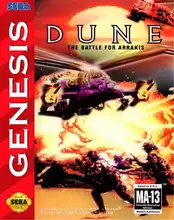Stepping onto the sands of Arrakis has always been a perilous, yet strangely compelling, journey. Frank Herbert's sprawling universe of spice, sandworms, and political intrigue has captured imaginations for decades, and naturally, it wasn't long before game developers wanted a piece of that action. If you're like me, you might remember a time when the PC was king, and the promise of controlling your own house on Dune was the ultimate fantasy.
The history of Dune games is as rich and layered as the spice itself, spanning various genres and platforms. While newer titles are bringing the desert planet to a new generation, let's take a trip back to where many of us first experienced the digital sands: the classic PC era.
The Classic PC Era: Our First Steps on Arrakis
Back in the early 90s, two very different games arrived almost simultaneously, both based on the Dune universe, and both leaving indelible marks on PC gaming history.
Dune (1992): The Adventure with Strategy Sprinkles
Developed by Cryo Interactive, this game was a unique blend of adventure, strategy, and role-playing. You played as Paul Atreides, fresh off the boat (or rather, the ornithopter) on Arrakis. It followed the book's storyline relatively closely, mixing exploration and dialogue with strategic elements like managing spice harvesting, military units, and even ecology.
It had gorgeous, digitized graphics (for the time!) and a moody soundtrack that really captured the atmosphere. It felt like a grand, interactive movie, pulling you deep into the political drama and the strange beauty of Arrakis.
Dune II: The RTS Revolution Starts Here
Meanwhile, over at Westwood Studios, something truly groundbreaking was brewing. Dune II: The Building of a Dynasty (or Battle for Arrakis in Europe) is widely credited as the grandfather of the modern Real-Time Strategy genre. Forget turn-based waiting; this was about building bases, harvesting resources (Spice!), training units, and clicking like mad to crush your enemies in real-time.
Playing as one of the three main houses – Atreides, Harkonnen, or the mysterious Ordos – each with unique units, you fought for control of Arrakis territory by territory. The core loop of build-order, resource management, and tactical combat felt instantly addictive. It introduced concepts like base building, unit production, resource gathering, and fog of war that became staples of the genre for decades. Sandworms were, of course, a constant, terrifying threat to your precious harvesters!
Dune 2000 (1998): A Familiar Taste with New Polish
After the massive success of Dune II, Westwood revisited Arrakis in 1998 with Dune 2000. This was essentially a remake of Dune II using the engine from their wildly popular Command & Conquer series. It featured updated graphics, a slightly tweaked interface, and, famously, live-action cutscenes with actors like John Rhys-Davies.
While it didn't reinvent the wheel like its predecessor, Dune 2000 was a solid RTS that brought the classic Dune II gameplay to a new generation of gamers and operating systems. It felt familiar, looked better, and the FMV cutscenes added a certain cheesy charm that was peak 90s.
Emperor: Battle for Dune (2001): Stepping into 3D
Westwood's final foray into Arrakis RTS came in 2001 with Emperor: Battle for Dune. This time, the game went full 3D, offering more detailed environments and units. It expanded the scope, allowing alliances between the main houses and introducing sub-houses with unique units.
Emperor built upon the Dune II foundation but added layers of complexity and graphical fidelity. It was a worthy successor, though by this time, the RTS landscape was getting crowded. It still featured those beloved (or sometimes mocked) live-action cutscenes, a staple of Westwood's style.
Frank Herbert's Dune (2001): A Different Kind of Failure
Also released in 2001, this game from Cryo was based on the Sci Fi Channel miniseries. It was an ambitious attempt at a 3D action-adventure game starring Paul. Unfortunately, it was plagued by development issues and was critically panned upon release. It didn't capture the magic of the earlier games and is often remembered as a significant disappointment, contributing to Cryo's eventual bankruptcy.
Other Digital Expeditions on Arrakis
The journey didn't stop with the classic PC era, though for many retro fans, that's the golden age.
The Lost Games
Like whispers in the desert wind, some Dune games never saw the light of day. Dune Generations was a planned online RTS from Cryo that got cancelled. Dune: Ornithopter Assault was a Game Boy Advance title that was also canned, later released without the Dune license as Elland: The Crystal Wars.
Early Online Sands
Even in the early days of the internet, the Dune universe inspired fans. Text-based MUDs (Multi-User Dimensions) like Dune MUD allowed players to roleplay and interact in the world of Arrakis long before graphical MMOs were commonplace.
Modern Spice: Dune: Spice Wars & Awakening
Fast forward many years, and Dune is back in the gaming spotlight. Dune: Spice Wars (2022) is a modern RTS with 4X elements that successfully captures the political and military struggle for Arrakis. And looking ahead, Dune: Awakening is an ambitious open-world survival MMO on the horizon (due in 2025). These show the enduring appeal of Herbert's world for game developers.
Reclaiming Arrakis Today
Feeling nostalgic and want to revisit the classics? The good news is that several of the best Dune games from the PC era are readily available.
- Dune (1992) and Dune II (1992) can be tricky to get running on modern systems without a little help, but they are available digitally on platforms like GOG.com, often pre-configured to run in emulators like DOSBox. This is the easiest way to play them legally today.
- Dune 2000 and Emperor: Battle for Dune are also available on GOG.com, updated to run on modern Windows versions.
These digital storefronts are a fantastic resource for retro gamers looking to experience these pieces of gaming history without wrestling with old hardware or complex setup.
The Legacy of Dune Games
From pioneering the RTS genre with Dune II to blending adventure and strategy in the first Dune game, the series has left a significant mark on gaming history. While not every adaptation has been a masterpiece (Frank Herbert's Dune, we're looking at you), the best Dune games captured the essence of Arrakis – the harsh environment, the vital spice, the political maneuvering, and the sheer scale of the conflict.
Whether you're a veteran who remembers the pixelated harvesters or a newcomer drawn in by the recent films, exploring the history of Dune games offers a fascinating look at how this iconic sci-fi universe has been translated into interactive experiences over the decades. The spice must flow, and thankfully, so do the games!
FAQ
Q: What was the first Dune video game? A: The first licensed Dune video game was Dune, released by Cryo Interactive in 1992.
Q: Is Dune II really the first RTS? A: While there were earlier games with real-time elements, Dune II: The Building of a Dynasty is widely considered the game that established the core mechanics and interface conventions of the modern Real-Time Strategy (RTS) genre.
Q: Can I play the old Dune PC games on modern computers? A: Yes! Many classic Dune games like Dune, Dune II, Dune 2000, and Emperor: Battle for Dune are available digitally on platforms like GOG.com, pre-configured to run on modern Windows systems using emulation (like DOSBox for the older titles).
Q: Are there any new Dune games coming out? A: Yes, Dune: Awakening, an open-world survival MMO, is currently in development and expected to release in 2025. Dune: Spice Wars, a 4X/RTS hybrid, was also recently released.

